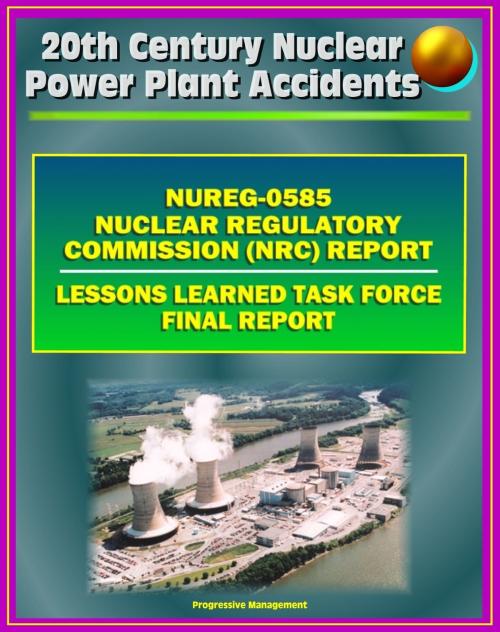Three Mile Island (TMI) Nuclear Power Plant Accident: NRC Official Lessons Learned Task Force Final Report (NUREG-0585) - 1979 Partial Meltdown with Radiation Releases
Nonfiction, Science & Nature, Science, Physics, General Physics, Social & Cultural Studies, Political Science| Author: | Progressive Management | ISBN: | 9781458180858 |
| Publisher: | Progressive Management | Publication: | March 24, 2011 |
| Imprint: | Smashwords Edition | Language: | English |
| Author: | Progressive Management |
| ISBN: | 9781458180858 |
| Publisher: | Progressive Management |
| Publication: | March 24, 2011 |
| Imprint: | Smashwords Edition |
| Language: | English |
This is a complete reproduction of the final NRC report on the 1979 nuclear meltdown accident at the Three Mile Island (TMI) plant in Pennsylvania, officially known as NUREG-0585. The TMI 2 Lessons Learned Task Force suggested change in several fundamental aspects of basic safety policy for nuclear power plants. Changes in nuclear power plant design and operations and in the regulatory process are discussed in terms of general goals. The appendix sets forth specific recommendations for reaching these goals.
The accident began about 4:00 a.m. on March 28, 1979, when the plant experienced a failure in the secondary, non-nuclear section of the plant. The main feedwater pumps stopped running, caused by either a mechanical or electrical failure, which prevented the steam generators from removing heat. First the turbine, then the reactor automatically shut down. Immediately, the pressure in the primary system (the nuclear portion of the plant) began to increase. In order to prevent that pressure from becoming excessive, the pilot-operated relief valve (a valve located at the top of the pressurizer) opened. The valve should have closed when the pressure decreased by a certain amount, but it did not. Signals available to the operator failed to show that the valve was still open. As a result, cooling water poured out of the stuck-open valve and caused the core of the reactor to overheat. As coolant flowed from the core through the pressurizer, the instruments available to reactor operators provided confusing information. There was no instrument that showed the level of coolant in the core. Instead, the operators judged the level of water in the core by the level in the pressurizer, and since it was high, they assumed that the core was properly covered with coolant. In addition, there was no clear signal that the pilot-operated relief valve was open. As a result, as alarms rang and warning lights flashed, the operators did not realize that the plant was experiencing a loss-of-coolant accident. They took a series of actions that made conditions worse by simply reducing the flow of coolant through the core. Because adequate cooling was not available, the nuclear fuel overheated to the point at which the zirconium cladding (the long metal tubes which hold the nuclear fuel pellets) ruptured and the fuel pellets began to melt. It was later found that about one-half of the core melted during the early stages of the accident. Although the TMI-2 plant suffered a severe core meltdown, the most dangerous kind of nuclear power accident, it did not produce the worst-case consequences that reactor experts had long feared. In a worst-case accident, the melting of nuclear fuel would lead to a breach of the walls of the containment building and release massive quantities of radiation to the environment. But this did not occur as a result of the three Mile Island accident.
This is a privately authored news service and educational publication of Progressive Management.
This is a complete reproduction of the final NRC report on the 1979 nuclear meltdown accident at the Three Mile Island (TMI) plant in Pennsylvania, officially known as NUREG-0585. The TMI 2 Lessons Learned Task Force suggested change in several fundamental aspects of basic safety policy for nuclear power plants. Changes in nuclear power plant design and operations and in the regulatory process are discussed in terms of general goals. The appendix sets forth specific recommendations for reaching these goals.
The accident began about 4:00 a.m. on March 28, 1979, when the plant experienced a failure in the secondary, non-nuclear section of the plant. The main feedwater pumps stopped running, caused by either a mechanical or electrical failure, which prevented the steam generators from removing heat. First the turbine, then the reactor automatically shut down. Immediately, the pressure in the primary system (the nuclear portion of the plant) began to increase. In order to prevent that pressure from becoming excessive, the pilot-operated relief valve (a valve located at the top of the pressurizer) opened. The valve should have closed when the pressure decreased by a certain amount, but it did not. Signals available to the operator failed to show that the valve was still open. As a result, cooling water poured out of the stuck-open valve and caused the core of the reactor to overheat. As coolant flowed from the core through the pressurizer, the instruments available to reactor operators provided confusing information. There was no instrument that showed the level of coolant in the core. Instead, the operators judged the level of water in the core by the level in the pressurizer, and since it was high, they assumed that the core was properly covered with coolant. In addition, there was no clear signal that the pilot-operated relief valve was open. As a result, as alarms rang and warning lights flashed, the operators did not realize that the plant was experiencing a loss-of-coolant accident. They took a series of actions that made conditions worse by simply reducing the flow of coolant through the core. Because adequate cooling was not available, the nuclear fuel overheated to the point at which the zirconium cladding (the long metal tubes which hold the nuclear fuel pellets) ruptured and the fuel pellets began to melt. It was later found that about one-half of the core melted during the early stages of the accident. Although the TMI-2 plant suffered a severe core meltdown, the most dangerous kind of nuclear power accident, it did not produce the worst-case consequences that reactor experts had long feared. In a worst-case accident, the melting of nuclear fuel would lead to a breach of the walls of the containment building and release massive quantities of radiation to the environment. But this did not occur as a result of the three Mile Island accident.
This is a privately authored news service and educational publication of Progressive Management.















